Contents
- Description of the preparation
- Composition and principle of action
- Types of Fitosporin
- Advantages and disadvantages of the drug
- Is it possible to process potatoes with Fitosporin for storage
- Is it possible to spray potatoes with Fitosporin during ripening
- How to process potatoes with Fitosporin
- Consumption rates
- Compatibility with other drugs
- accident prevention
- Conclusion
- Feedback on the use of Fitosporin for potatoes
Proper preparation of potato tubers for planting is the key to a good harvest at the end of the season. Many gardeners do not limit themselves to their germination, additionally using agrochemicals to protect against diseases and pests that are most dangerous for a given variety or hybrid, and to stimulate plant development. A popular method is the treatment of potatoes before planting with Fitosporin: this drug is valued for its environmental safety, complex effect and ease of use.
Description of the preparation
Fitosporin (Fitosporin-M) is a systemic domestic fungicide of biological origin. Produced by the organization NVP “BashInkom” in different types and volumes.
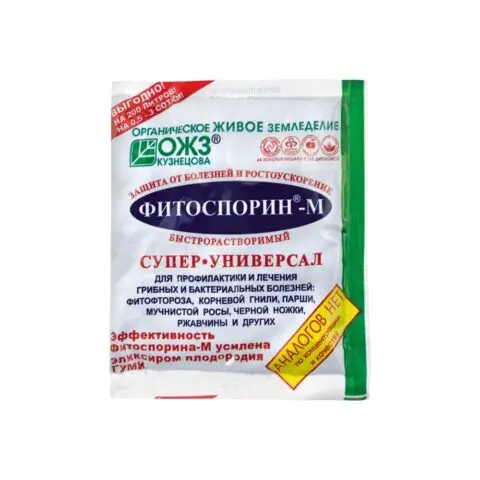
The biofungicide is suitable for the treatment of any horticultural crops, including potatoes, during the entire period of active vegetation.
The drug “works” in a wide temperature range – from -40 to 50 ° C. The use of Fitosporin provides a complex effect – immunostimulating and “anti-stress”. The drug protects potatoes from any negative external influences, including the vagaries of the weather, the nuances of the local climate, the consequences of the use of other agrochemicals.
It also reduces the risk of potato infection at any stage of development – from preparation for planting to storage of tubers. Efficiency against pathogenic microflora, depending on the disease, varies between 65-95%. Spraying potatoes with Fitosporin is effective for protection against:
- phytophthora;
- Phomosis;
- alternariosis;
- fusariosis;
- any kind of rot;
- scab;
- rhizoctoniosis;
- septoriosis;
- tracheomycosis;
- rust;
- true and downy mildew;
- bacterial cancer;
- bacterial spotting.
Pre-planting treatment of potato tubers with Fitosporin activates the process of plant development and the formation of the root system. This has a positive effect on the volume of the crop and its quality.
Composition and principle of action
Phytosporin is a fungicide of completely biological origin. The spores of soil bacteria Bacillus Subtilis (better known as “hay bacillus”) strain 26D are “responsible” for protecting potatoes from diseases. For accelerating development and increasing productivity – GUMI organic fertilizer based on humate, “enriched” with a whole range of microelements (nitrogen, potassium, phosphorus, magnesium, bromine, selenium, copper, and so on).
The content of soil bacteria (spores and “live” cells) varies depending on the form of release of the drug:
- minimum 100 mln. in pastes;
- at least 1 billion in suspension;
- maximum 2 billion in powder.
Phytosporin is a systemic fungicide that acts at the cellular level. Getting on potato tubers during pre-planting treatment and on the aerial part of plants when spraying, in the garden it is almost instantly “absorbed” inside and spreads through the vascular system, “impregnating” all tissues.
Further, the bacteria in Fitosporin are activated. This requires water, so it is used in the form of a solution for processing potatoes and other crops. In the process of their vital activity, oligopeptides are synthesized that have the properties of fungicides and antibiotics.
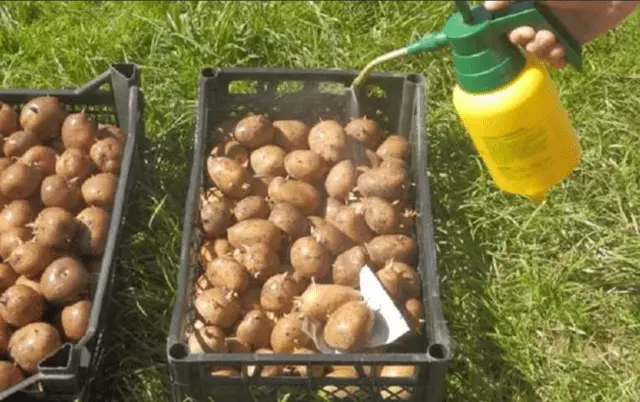
Bacteria have a “depressing” effect on any pathogenic microflora that tries to penetrate tissues from the outside, preventing its reproduction.
GUMI “works” like any fertilizer based on humates. It not only activates the development of potatoes, but also improves the quality of the substrate, increasing its fertility. With regular use, Fitosporin can restore even very depleted or “poor” soil.
Types of Fitosporin
The release of Fitosporin in various forms allows you to choose the most convenient option for processing potatoes:
- The paste is very thick, almost black. Packing in packages of 100 and 200 g.
- The powder is fine, grayish, reminiscent of ash. Packing in packages of 10 and 30 g.
- Aqueous suspension is quite thick, gel-like, colorless. Packing in bottles of 0,11, 0,2, 0,3 liters and canisters of 10 liters.
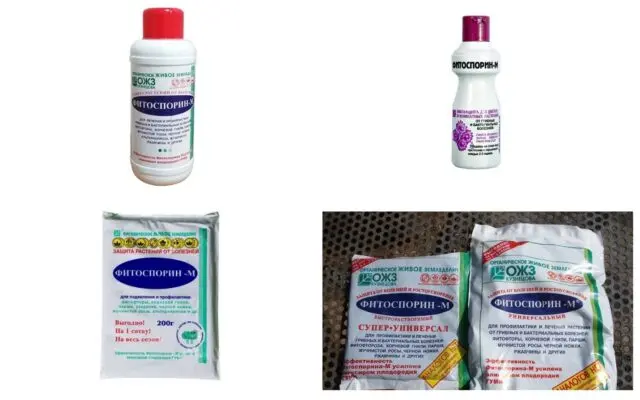
The process of preparing a working solution and treating tubers or plants is almost the same, regardless of the type of fungicide.
Depending on what is the primary task of processing potatoes with Fitosporin, the gardener chooses a type of preparation of one of three directions of action:
- Biosecurity against diseases. Produced in the form of powder and liquid in different packaging. There is Fitosporin-Universal and specialized preparations for different crops (tomatoes, cucumbers, potatoes, cabbage, garden flowers) and seedlings.
- Disease prevention. Not only reduces the risk of infection, but also activates the development of plants, increases their resistance to negative external influences. Available in the form of a paste. There are options for Fitosporin-Universal, Super-Universal and products specifically for tomatoes and potatoes.
- Harvest safety. It is used not only for processing tubers, but also for spraying potatoes shortly before harvesting. Available in powder and liquid form. Preparations Fitosporin AntiRot and Golden Autumn are suitable for any horticultural crops.
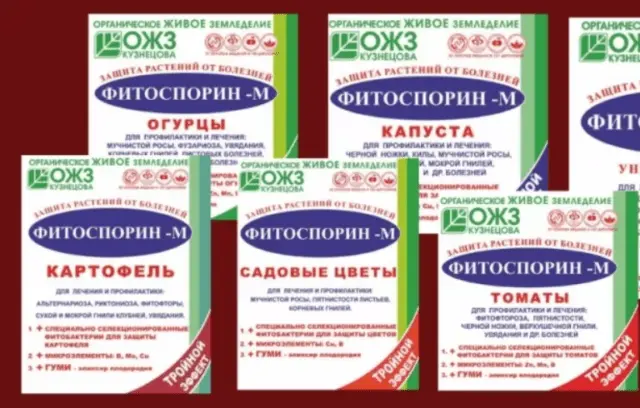
Varieties of fungicide for each crop differ slightly in the composition of macro- and microelements, their proportions
Advantages and disadvantages of the drug
Gardeners choose Fitosporin for processing potatoes, given its undoubted advantages:
- safety for the environment, human health, pets;
- possibility of application at any stage of active vegetation and during storage;
- a variety of forms and volumes of release;
- affordable price;
- ease of use;
- complex effect;
- universality;
- inability of pathogens to develop resistance to the drug.
There are also some disadvantages:
- inability to “cure” potatoes if infection with a pathogen occurred before processing, and the disease passed into a severe stage (here it is advisable to use strong chemicals instead of Fitosporin);
- unsuitable for use on clear days.
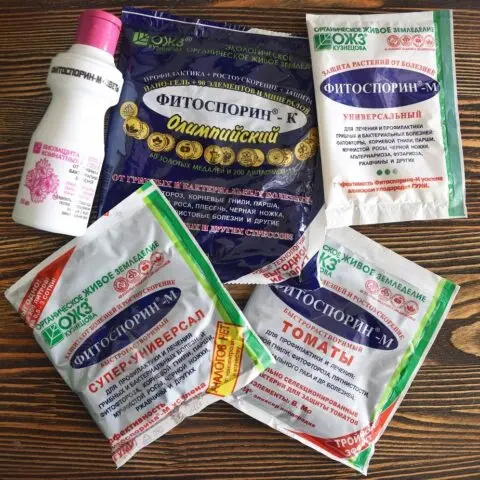
Fitosporin is not without certain disadvantages, but it clearly has more advantages.
Is it possible to process potatoes with Fitosporin for storage
To ensure the safety of the crop, there are special varieties of the drug. In order to properly treat potatoes for storage with Fitosporin, they are sprayed immediately before laying them in the basement, cellar, then dried well. This allows you to protect the crop from fusarium, late blight, various types of rot.
The drug can be used not only for spraying tubers, but also for processing their storage place, containers, means of transportation. It is also possible to treat seed potatoes with Fitosporin after landscaping before storage.
Is it possible to spray potatoes with Fitosporin during ripening
Phytosporin is suitable for processing potatoes at any stage of active vegetation, including during the ripening of tubers. The experience of gardeners shows that spraying shortly before harvesting increases its keeping quality by 1,5-2 times, improves the taste of tubers.
How to process potatoes with Fitosporin
Any treatment of potatoes with Fitosporin after germination is carried out on cloudy days or in the evenings. Otherwise, the effectiveness of the drug drops sharply, the bacteria in its composition die en masse. The working solution is always prepared in advance, 1,5-2 hours before the procedure.
Powder
It is necessary to dilute 5 g of powder in 250 ml of water. Potatoes are processed by spraying liquid from a fine spray gun as evenly as possible. Then dry them well. If infection with pathogenic microflora is suspected or if symptoms of diseases were observed in plants in this garden bed last season, the treatment with a solution of the same concentration is repeated when the tops stretch to 6-8 cm.
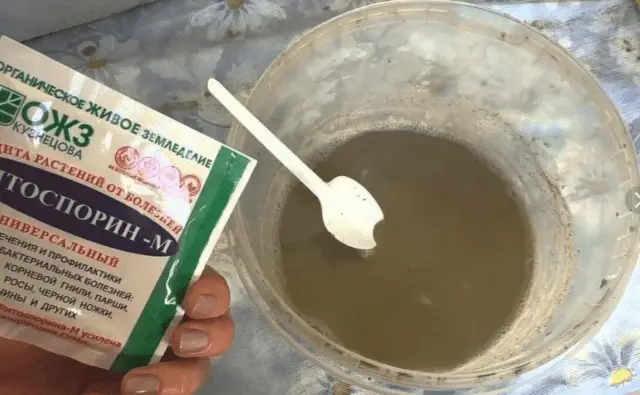
The drug dissolves quickly and without residue, it is enough to stir the liquid intensively for about a minute
Paste
The “mother” solution of the paste is prepared by diluting it with water in a ratio of 1:2. Before use, its concentration is reduced according to the following proportions:
- for processing potato tubers before planting – 3 tbsp. l. for 200 ml of water;
- for spraying plants in the garden – 3 tsp. for 1 liter of water.
Important! To prepare the solution, settled or otherwise softened water is suitable. Compounds of chlorine and fluorine are harmful to the bacteria contained in Fitosporin.
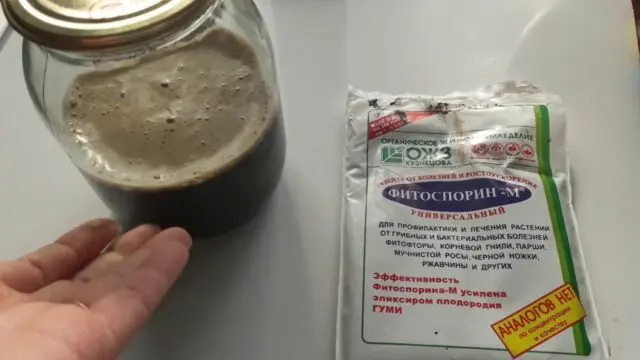
“Mother” solution retains consumer properties for 6-8 weeks
Liquid
The concentration of the Fitosporin suspension solution for treating potato tubers before planting and plants in the garden is the same – ten drops per 200 ml of water. In general, it does not change regardless of any work for which the fluid is intended.
Consumption rates
The approximate consumption rate of Fitosporin solution when spraying potato tubers is 200-250 ml per 10 kg of planting material. Their dusting with powder is less commonly practiced – here the norm is about 30 g per 10 kg.
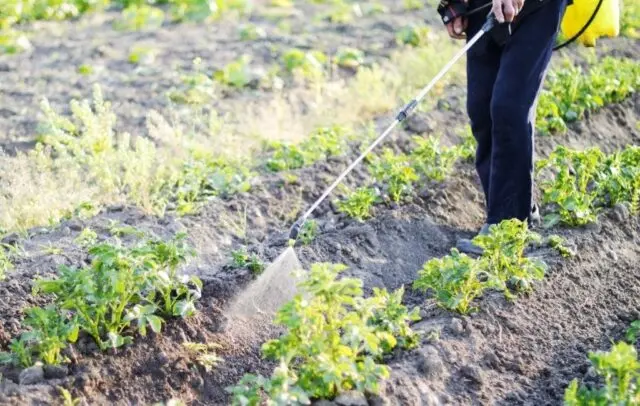
Liquid consumption when processing plants in the garden – 1-1,2 liters per 10 m²
Compatibility with other drugs
Phytosporin can be used in conjunction with most other agrochemicals:
- complex fertilizers;
- biostimulants and growth stimulants;
- insecticides (“narrowly targeted” and broad-spectrum);
- fungicides.
However, it should be taken into account that Fitosporin contains humates, therefore it is not advisable to use it for potatoes in combination with other organic and organomineral fertilizers. This can provoke a “super-saturation” of the soil with nutrients, which is worse for the crop than their deficiency.
accident prevention
According to the manufacturer’s description, Phytosporin for humans is an agrochemical of hazard class IV (low-hazardous substances). It is non-phytotoxic, safe for pets and beneficial insects. The only exception is bees (hazard class III, a protective zone with a radius of 4-5 km is required).
Nevertheless, it is necessary to strictly follow the instructions for Fitosporin-M for its use for potatoes. We must not forget about basic precautions, especially with a tendency to allergies and hypersensitivity of the skin.
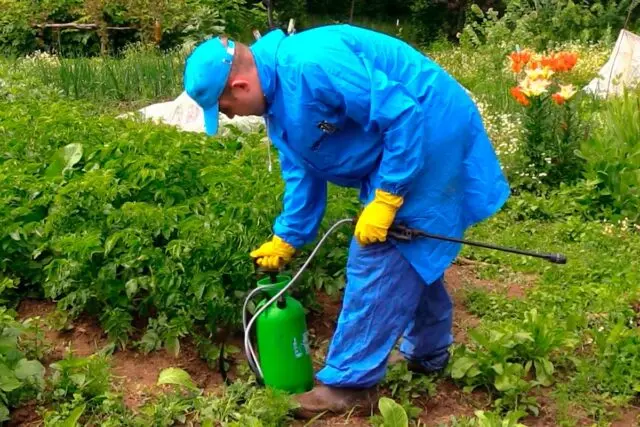
It is necessary to prepare the solution and spray the tubers in tight rubber gloves, it is also desirable to have glasses and a respirator
If, during the processing of potatoes, the Fitosporin solution gets on the skin, it is washed off with cool running water. In case of accidental ingestion – take activated charcoal, rinse the stomach, induce vomiting.
Conclusion
The treatment of potatoes before planting with Fitosporin not only protects the tubers from the most typical pathogens for the culture, but also activates the process of their development, and has a positive effect on the overall plant endurance. Such a complex effect, of course, affects the yield. But you can count on “increased performance” only if the drug is used correctly, in strict accordance with the manufacturer’s instructions.










